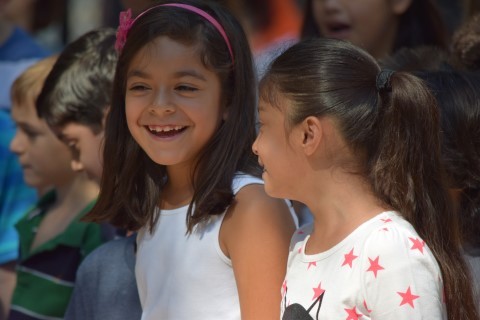I'm often asked what works in education. After starting and leading public schools in Texas for nearly four decades, my response is straightforward: Start young, involve parents, empower children in their own development and be patient in fostering their eventual success.
Great education starts with early learning, sets high expectations for children and educators and provides a structure to develop the full range of each child's intellectual, social and emotional skills. It meets children where they are, leverages their desire to learn, and surrounds each child with the support they need to reach their potential. It takes place in mixed-aged classrooms, with student-centric learning, uninterrupted work periods and teachers who serve as guides, not as authority figures. Most importantly, parents are active partners in this growth experience, not just overseers of the homework club.
Many years ago I joined with parents and other educators to make this vision real for children in a low-income neighborhood of Dallas, Texas. We were determined to bring the best of private schooling to children who had the least chance of accessing top quality education. We chose Montessori because it has over 100 years of success in transforming the lives of children from all walks of life.
Education is certainly a prescription for a better life, but each child needs a different dose at different stages. "Take two math worksheets home and come back in the morning" isn't a cure-all for increasing achievement. Learning is developmental and each child matures differently. Our programs deliver education that grows patiently and persistently with each child. By also informing parents of key psychological characteristics during successive developmental stages, parents grow along with their children and become strong partners with the school.
Ira is a classic example. The son of a single mother who was forced to drop out of high school to support him, Ira started our public school at age three, early enough to address his many challenges. Ira was easily distracted, had difficulty following directions, completing assignments and had trouble connecting with peers because of his inability to control his behavior.
His mother was determined to help him succeed. We made her a partner in her child's development through volunteer workdays, parent workshops and a close working relationship with Ira's teacher. Our multi-aged classes allowed Ira and his mother to work with one teacher for three years, building trust through struggles and victories. Montessori classrooms create a culture where children learn at their own pace, without shame if they fall behind or frustration if they're ready to race ahead.
Like all of his schoolmates, Ira was given personal responsibility, small group instruction and individualized support. This approach provides constant opportunities for children to practice executive function skills by monitoring their own behavior and developing alternatives when they are frustrated. As Ira learned to be more aware of his behavior, he was able to make better choices when interacting with others and began making friends.
Our classrooms tap into children's internal motivation, and that proved to be the major turning point for Ira. His teacher noticed that Ira was showing a real interest in birds, and she looked for ways to bring birds into Ira's school life.
The results were immediate. Ira became the class "expert" on birds. Opportunities to shine and share his knowledge with the class improved his reputation with classmates and gave him focus and direction for his work. At the end of the school year, Ira completed a written and illustrated research paper on birds and proudly shared it with his mother and classmates.
Ira went on to receive a scholarship at a prestigious private school. While his family still struggles to make ends meet, Ira has the skills to persevere and actualize his potential. He graduated from high school and is currently working full time in order to save money to attend college.
Ira is not our only success story. This type of education can be made real for each child, regardless of socio-economic status. Our school's student population is 77% low income and 80% Hispanic, with 62% having a primary language other than English. Yet, 94% of children who attended our school through third grade graduated from high school. Of our alumni who graduated from high school, 89% attended college, compared to the state average of 56%. Outcomes like these are convincing many troubled schools to adopt public Montessori models to transform their students and communities.
All of this speaks to the future of public education and how we can turn the corner to better serve children. Public education doesn't have to be a factory where one size fits all. Through the Montessori approach, Lumin customizes education to help children build their unique road to success. When we start young, involve parents, and empower children with patience and kindness, they grow into the lifelong learners and productive, fulfilled adults we aspire to for all of America's children.
